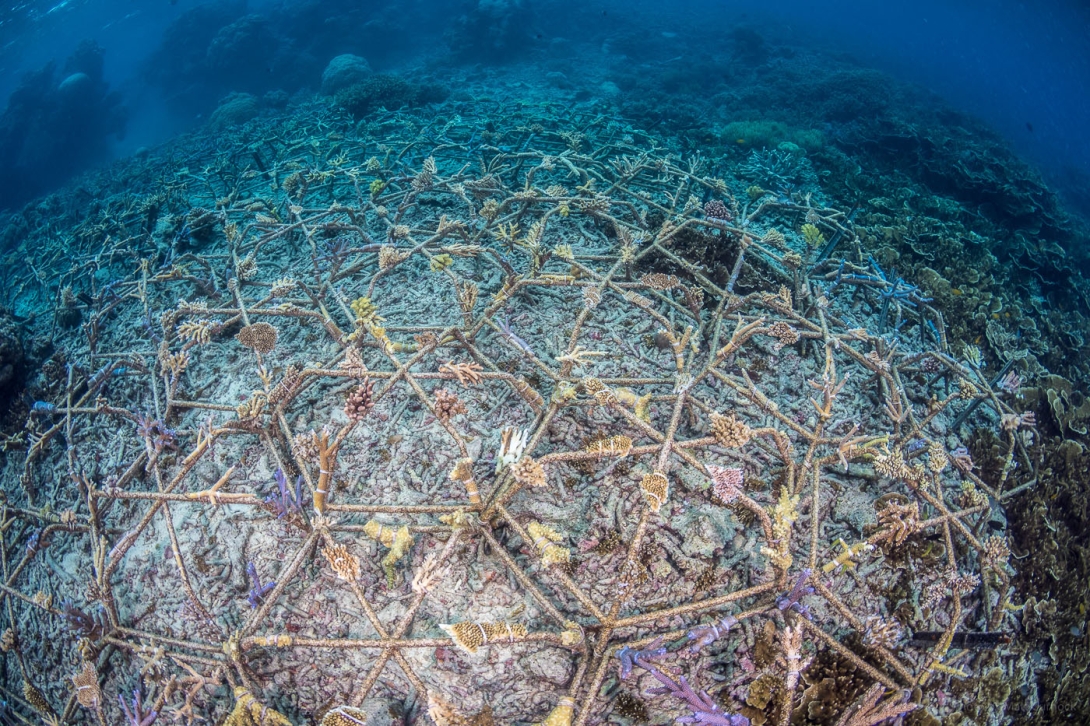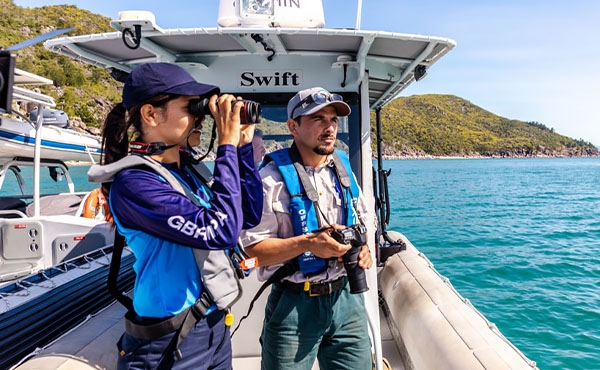Knowledge, research and monitoring are critical in this time of rapid change as a means to address diverse impacts on the Reef from multiple and cumulative stressors. Adaptability and flexibility are needed given the range of possible scenarios related to the predicted impacts of climate change and other threats. There are substantive knowledge gaps for biodiversity in relation to ecosystem function and processes, population recruitment, various species and habitats. Cumulative impacts are challenging to quantify, assess and manage and are little understood in the Region but through descriptive qualitative models 1697 and spatial mapping tools they are beginning to be better understood.
Knowledge, research and monitoring are critical in times of rapid change
Continual revision of research management tools such as the Science and Knowledge Needs for Management,1386 the Scientific Consensus Statement 1991 and the National Environmental Science Program, help to communicate and drive research outcomes that can underpin effective decision-making. In 2021 the Priority Monitoring Gaps Prospectus: Reef 2050 Integrated Monitoring and Reporting Program 2009 identified 11 priority monitoring gaps to track managing agency progress against the objectives of the Reef 2050 Plan. The Reef Trust Partnership has invested in filling these priority gaps and their integrated application to decision-making.
Monitoring of Reef governance systems is in its infancy. The Reef 2050 Integrated Monitoring and Reporting Program identified governance was a critical monitoring gap and as a result indicators are being developed to better monitor and assess governance effectiveness. This work is funded by the Reef Trust Partnership and is expected to improve understanding of what constitutes governance and how it can enhance decision-making.
Key partnerships such as those among the Reef Authority, CSIRO, the Australian Institute of Marine Science and universities, and less formalised citizen science programs such as the Eye on the Reef program, will continue to play important roles in addressing knowledge gaps. The Reef 2050 Integrated Monitoring and Reporting Program encompasses a broad suite of ecological and human dimensions monitoring programs and projects that provide information on the condition and trends of values. It also supports critical improvements in data integration, accessibility and use, to aid adaptive management of the Reef.
Various Reef rehabilitation projects are in place. There are about 19 in-water coral reef restoration projects since 2017 and coral restoration and adaptation is a growing field of research, including the Reef Restoration and Adaptation Program which launched in 2020. Challenges remain in understanding the feasibility and cost-effectiveness of scaling up many of the proposed interventions and in assessing socio-economic impacts.32

The key challenges for research and monitoring of the Region include: integrating a wide range of diverse knowledge sets across multiple sectors, in particular traditional knowledges; monitoring of Traditional Owner reef use and wellbeing; consolidating data from Reef-related projects; presenting data in an easily accessible format and expanding monitoring and modelling in response to a climate-changed future to support decision-making.
Reporting and evaluation are carried out through various tools. The Outlook Report, published every five years, provides a regular and comprehensive basis for evaluating and reporting on the condition and management of the Region. The findings of the Outlook Report inform the review process for the Reef 2050 Plan — the overarching strategy for Reef management. The Reef 2050 Plan includes clear monitoring and reporting requirements, and the Reef 2050 Integrated Monitoring and Reporting Program provides support for an improved integrated framework for reporting on Reef health and management actions under the plan. Indicators for Reef health are set under the Reef 2050 Objectives and Goals 2021–2025 2013 and relate to coral reef habitats, seagrass, natural wetlands, islands and a range of important fauna (e.g. protected species, seabirds, bioculturally important fish and invertebrate species). Implementation of the Reef 2050 Integrated Monitoring and Reporting Program is ongoing in the current reporting period.
Reef Trust investments are delivered by various partners, who report on project performance every six months through the online monitoring, evaluation, reporting and improvement tool (MERIT). Part of the Queensland Government’s investment into the Queensland Reef Water Quality Program supports the Paddock to Reef Program.1995 The Paddock to Reef program publishes Reef Water Quality Report Cards that provide an evaluation of water quality management outcomes within the Reef, though there can be a lag time of a few years between data collection and reporting. Regional Report Cards are released annually and report on conditions from freshwater to marine zones.1996 Condition (and trend in condition) of some Reef ecosystems are evaluated and reported annually through the Marine Monitoring Program 579 (inshore water quality, coral and seagrass health) and the Long-term Monitoring Program 386 (offshore reef health).
Key challenges include incorporating a wide range of diverse knowledge sets across multiple sectors, particularly Traditional Knowledge 2006 and effectively communicating findings to all stakeholders, especially the public.


